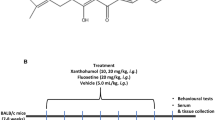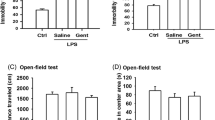Abstract
Purpose
Depression is frequently associated with inflammation, whereas omega-3 polyunsaturated fatty acids (PUFAs) primarily found in fish oil possess anti-inflammatory properties. Although converging studies suggest an antidepressant effect of PUFAs, there is limited evidence directly linking the neuro-immune modulating features of PUFAs to the antidepressant actions.
Methods
Therefore, we assessed the effects of fish oil (FO) supplementation on behavioral changes, inflammatory cytokine expression and oxidative reactions in frontal cortex and hippocampus of rats following repeated peripheral immune challenge by lipopolysaccharide (LPS) for 2 weeks (500 μg/kg every other day).
Results
Repeated LPS administration induced the rats to a depressive-like state and increased mRNA expression of pro-inflammatory cytokines, including 1L-1β, 1L-6 and TNF-α, in frontal cortex and hippocampus. FO supplementation attenuated the LPS-induced abnormal behavior and brain inflammatory response. Concurrent with the antidepressant action, FO also reduced LPS-induced oxidative reactions and neural apoptosis in the rat brain, as evidenced by decreased malondialdehyde (MDA) production, increased catalase activities and inhibited pro-apoptotic protein Bax mRNA expression. In addition, FO inhibited activation of NF-κB and iNOS induced by LPS. Interestingly, we found FO suppressed the activation of the inflammasome NLRP3 and ionotropic purinergic receptor P2X7R evoked by LPS, suggesting a potential anti-inflammatory mechanism for PUFAs. Besides, FO also restored the LPS-induced neurochemical disturbance, especially the balance between serotonin and kynurenine branches of tryptophan metabolism, which is tightly associated with depression.
Conclusions
These findings provide novel insights into the antidepressant action of PUFAs and further strengthen the link between inflammation and depression.






Similar content being viewed by others
References
Liu Y, Ho RC, Mak A (2012) Interleukin (IL)-6, tumour necrosis factor alpha (TNF-alpha) and soluble interleukin-2 receptors (sIL-2R) are elevated in patients with major depressive disorder: a meta-analysis and meta-regression. J Affect Disord 139(3):230–239. doi:10.1016/j.jad.2011.08.003
Rush G, O’Donovan A, Nagle L, Conway C, McCrohan A, O’Farrelly C, Lucey JV, Malone KM (2016) Alteration of immune markers in a group of melancholic depressed patients and their response to electroconvulsive therapy. J Affect Disord 205:60–68. doi:10.1016/j.jad.2016.06.035
Matcham F, Rayner L, Steer S, Hotopf M (2013) The prevalence of depression in rheumatoid arthritis: a systematic review and meta-analysis. Rheumatology 52(12):2136–2148. doi:10.1093/rheumatology/ket169
Nikkheslat N, Zunszain PA, Horowitz MA, Barbosa IG, Parker JA, Myint AM, Schwarz MJ, Tylee AT, Carvalho LA, Pariante CM (2015) Insufficient glucocorticoid signaling and elevated inflammation in coronary heart disease patients with comorbid depression. Brain Behav Immun 48:8–18. doi:10.1016/j.bbi.2015.02.002
Stuart MJ, Baune BT (2012) Depression and type 2 diabetes: inflammatory mechanisms of a psychoneuroendocrine co-morbidity. Neurosci Biobehav Rev 36(1):658–676. doi:10.1016/j.neubiorev.2011.10.001
Capuron L, Ravaud A, Miller AH, Dantzer R (2004) Baseline mood and psychosocial characteristics of patients developing depressive symptoms during interleukin-2 and/or interferon-alpha cancer therapy. Brain Behav Immun 18(3):205–213. doi:10.1016/j.bbi.2003.11.004
Adzic M, Djordjevic J, Mitic M, Brkic Z, Lukic I, Radojcic M (2015) The contribution of hypothalamic neuroendocrine, neuroplastic and neuroinflammatory processes to lipopolysaccharide-induced depressive-like behaviour in female and male rats: Involvement of glucocorticoid receptor and C/EBP-beta. Behav Brain Res 291:130–139. doi:10.1016/j.bbr.2015.05.029
Su KP, Wang SM, Pae CU (2013) Omega-3 polyunsaturated fatty acids for major depressive disorder. Expert Opin Investig Drugs 22(12):1519–1534. doi:10.1517/13543784.2013.836487
Chang CY, Kuan YH, Li JR, Chen WY, Ou YC, Pan HC, Liao SL, Raung SL, Chang CJ, Chen CJ (2013) Docosahexaenoic acid reduces cellular inflammatory response following permanent focal cerebral ischemia in rats. J Nutr Biochem 24(12):2127–2137. doi:10.1016/j.jnutbio.2013.08.004
Casali BT, Corona AW, Mariani MM, Karlo JC, Ghosal K, Landreth GE (2015) Omega-3 fatty acids augment the actions of nuclear receptor agonists in a mouse model of Alzheimer’s disease. J Neurosci 35(24):9173–9181. doi:10.1523/JNEUROSCI.1000-15.2015
Luchtman DW, Meng Q, Song C (2012) Ethyl-eicosapentaenoate (E-EPA) attenuates motor impairments and inflammation in the MPTP-probenecid mouse model of Parkinson’s disease. Behav Brain Res 226(2):386–396. doi:10.1016/j.bbr.2011.09.033
Li K, Huang T, Zheng J, Wu K, Li D (2014) Effect of marine-derived n-3 polyunsaturated fatty acids on C-reactive protein, interleukin 6 and tumor necrosis factor alpha: a meta-analysis. PloS one 9(2):e88103. doi:10.1371/journal.pone.0088103
Grosso G, Micek A, Marventano S, Castellano S, Mistretta A, Pajak A, Galvano F (2016) Dietary n-3 PUFA, fish consumption and depression: A systematic review and meta-analysis of observational studies. J Affect Disord 205:269–281. doi:10.1016/j.jad.2016.08.011
Grosso G, Pajak A, Marventano S, Castellano S, Galvano F, Bucolo C, Drago F, Caraci F (2014) Role of omega-3 fatty acids in the treatment of depressive disorders: a comprehensive meta-analysis of randomized clinical trials. PloS One 9(5):e96905. doi:10.1371/journal.pone.0096905
Shinto L, Marracci G, Mohr DC, Bumgarner L, Murchison C, Senders A, Bourdette D (2016) Omega-3 fatty acids for depression in multiple sclerosis: a randomized pilot study. PloS One 11(1):e0147195. doi:10.1371/journal.pone.0147195
Hennebelle M, Balasse L, Latour A, Champeil-Potokar G, Denis S, Lavialle M, Gisquet-Verrier P, Denis I, Vancassel S (2012) Influence of omega-3 fatty acid status on the way rats adapt to chronic restraint stress. PloS One 7(7):e42142. doi:10.1371/journal.pone.0042142
Song C, Leonard BE, Horrobin DF (2004) Dietary ethyl-eicosapentaenoic acid but not soybean oil reverses central interleukin-1-induced changes in behavior, corticosterone and immune response in rats. Stress 7(1):43–54. doi:10.1080/10253890410001667188
Skaper SD, Debetto P, Giusti P (2010) The P2 × 7 purinergic receptor: from physiology to neurological disorders. FASEB J 24 (2):337–345. doi:10.1096/fj.09-138883
Iwata M, Ota KT, Li XY, Sakaue F, Li N, Dutheil S, Banasr M, Duric V, Yamanashi T, Kaneko K, Rasmussen K, Glasebrook A, Koester A, Song D, Jones KA, Zorn S, Smagin G, Duman RS (2016) Psychological stress activates the inflammasome via release of adenosine triphosphate and stimulation of the purinergic type 2 × 7 receptor. Biol Psychiatry 80(1):12–22. doi:10.1016/j.biopsych.2015.11.026
Halmai Z, Dome P, Vereczkei A, Abdul-Rahman O, Szekely A, Gonda X, Faludi G, Sasvari-Szekely M, Nemoda Z (2013) Associations between depression severity and purinergic receptor P2RX7 gene polymorphisms. J Affect Disord 150(1):104–109. doi:10.1016/j.jad.2013.02.033
Basso AM, Bratcher NA, Harris RR, Jarvis MF, Decker MW, Rueter LE (2009) Behavioral profile of P2 × 7 receptor knockout mice in animal models of depression and anxiety: relevance for neuropsychiatric disorders. Behav Brain Res 198(1):83–90. doi:10.1016/j.bbr.2008.10.018
Zhang Y, Liu L, Liu YZ, Shen XL, Wu TY, Zhang T, Wang W, Wang YX, Jiang CL (2015) NLRP3 inflammasome mediates chronic Mild stress-induced depression in mice via neuroinflammation. Int J Neuropsychopharmacol 18 (8). doi:10.1093/ijnp/pyv006
Moylan S, Berk M, Dean OM, Samuni Y, Williams LJ, O’Neil A, Hayley AC, Pasco JA, Anderson G, Jacka FN, Maes M (2014) Oxidative and nitrosative stress in depression: why so much stress? Neurosci Biobehav Rev 45:46–62. doi:10.1016/j.neubiorev.2014.05.007
Leonard B, Maes M (2012) Mechanistic explanations how cell-mediated immune activation, inflammation and oxidative and nitrosative stress pathways and their sequels and concomitants play a role in the pathophysiology of unipolar depression. Neurosci Biobehav Rev 36(2):764–785. doi:10.1016/j.neubiorev.2011.12.005
Savitz J (2016) Role of kynurenine metabolism pathway activation in major depressive disorders. Curr Top Behav Neurosci. doi:10.1007/7854_2016_12
Maes M, Leonard BE, Myint AM, Kubera M, Verkerk R (2011) The new ‘5-HT’ hypothesis of depression: cell-mediated immune activation induces indoleamine 2,3-dioxygenase, which leads to lower plasma tryptophan and an increased synthesis of detrimental tryptophan catabolites (TRYCATs), both of which contribute to the onset of depression. Progress Neuropsychopharmacol Biol Psychiatry 35 (3):702–721. doi:10.1016/j.pnpbp.2010.12.017
Sperner-Unterweger B, Kohl C, Fuchs D (2014) Immune changes and neurotransmitters: possible interactions in depression? Progress Neuropsychopharmacol Biol Psychiatry 48:268–276. doi:10.1016/j.pnpbp.2012.10.006
Lamaziere A, Richard D, Barbe U, Kefi K, Bausero P, Wolf C, Visioli F (2011) Differential distribution of DHA-phospholipids in rat brain after feeding: a lipidomic approach. Prostaglandins Leukot Essent Fatty Acids 84:7–11. doi:10.1016/j.plefa.2010.11.001
Wu YQ, Dang RL, Tang MM, Cai HL, Li HD, Liao DH, He X, Cao LJ, Xue Y, Jiang P (2016) Long chain omega-3 polyunsaturated fatty acid supplementation alleviates doxorubicin-induced depressive-like behaviors and neurotoxicity in rats: involvement of oxidative stress and neuroinflammation. Nutrients 8(4):243. doi:10.3390/nu8040243
Jiang P, Zhang LH, Cai HL, Li HD, Liu YP, Tang MM, Dang RL, Zhu WY, Xue Y, He X (2014) Neurochemical effects of chronic administration of calcitriol in rats. Nutrients 6(12):6048–6059. doi:10.3390/nu6126048
Zhang L-H, Cai H-L, Jiang P, Li H-D, Cao L-J, Dang R-L, Zhu W-Y, Deng Y (2015) Simultaneous determination of multiple neurotransmitters and their metabolites in rat brain homogenates and microdialysates by LC-MS/MS. Analyt Methods 7(9):3929–3938. doi:10.1039/C5AY00308C
Elgarf AS, Aboul-Fotouh S, Abd-Alkhalek HA, El Tabbal M, Hassan AN, Kassim SK, Hammouda GA, Farrag KA, Abdel-tawab AM (2014) Lipopolysaccharide repeated challenge followed by chronic mild stress protocol introduces a combined model of depression in rats: reversibility by imipramine and pentoxifylline. Pharmacol Biochem Behav 126:152–162. doi:10.1016/j.pbb.2014.09.014
Brown GC, Neher JJ (2010) Inflammatory neurodegeneration and mechanisms of microglial killing of neurons. Mol Neurobiol 41(2–3):242–247. doi:10.1007/s12035-010-8105-9
Shah SA, Khan M, Jo MH, Jo MG, Amin FU, Kim MO (2016) Melatonin stimulates the SIRT1/Nrf2 signaling pathway counteracting lipopolysaccharide (LPS)-induced oxidative stress to rescue postnatal rat brain. CNS Neurosci Ther. doi:10.1111/cns.12588
Kerr DM, Harhen B, Okine BN, Egan LJ, Finn DP, Roche M (2013) The monoacylglycerol lipase inhibitor JZL184 attenuates LPS-induced increases in cytokine expression in the rat frontal cortex and plasma: differential mechanisms of action. Br J Pharmacol 169(4):808–819. doi:10.1111/j.1476-5381.2012.02237.x
Souza KL, Gurgul-Convey E, Elsner M, Lenzen S (2008) Interaction between pro-inflammatory and anti-inflammatory cytokines in insulin-producing cells. J Endocrinol 197(1):139–150. doi:10.1677/JOE-07-0638
Koo JW, Russo SJ, Ferguson D, Nestler EJ, Duman RS (2010) Nuclear factor-kappaB is a critical mediator of stress-impaired neurogenesis and depressive behavior. Proc Natl Acad Sci USA 107(6):2669–2674. doi:10.1073/pnas.0910658107
Mutlu O, Ulak G, Laugeray A, Belzung C (2009) Effects of neuronal and inducible NOS inhibitor 1-[2-(trifluoromethyl) phenyl] imidazole (TRIM) in unpredictable chronic mild stress procedure in mice. Pharmacol Biochem Behav 92 (1):82–87. doi:10.1016/j.pbb.2008.10.013
Choi HB, Ryu JK, Kim SU, McLarnon JG (2007) Modulation of the purinergic P2 × 7 receptor attenuates lipopolysaccharide-mediated microglial activation and neuronal damage in inflamed brain. J Neurosci 27(18):4957–4968. doi:10.1523/JNEUROSCI.5417-06.2007
Miller AH, Maletic V, Raison CL (2009) Inflammation and its discontents: the role of cytokines in the pathophysiology of major depression. Biol Psychiatry 65(9):732–741. doi:10.1016/j.biopsych.2008.11.029
Hunter RL, Dragicevic N, Seifert K, Choi DY, Liu M, Kim HC, Cass WA, Sullivan PG, Bing G (2007) Inflammation induces mitochondrial dysfunction and dopaminergic neurodegeneration in the nigrostriatal system. J Neurochem 100(5):1375–1386. doi:10.1111/j.1471-4159.2006.04327.x
Delattre AM, Carabelli B, Mori MA, Kempe PG, Rizzo de Souza LE, Zanata SM, Machado RB, Suchecki D, Andrade da Costa BL, Lima MM, Ferraz AC (2016) Maternal omega-3 supplement improves dopaminergic system in pre- and postnatal inflammation-induced neurotoxicity in Parkinson’s disease model. Mol Neurobiol. doi:10.1007/s12035-016-9803-8
Shin SS, Dixon CE (2011) Oral fish oil restores striatal dopamine release after traumatic brain injury. Neurosci Lett 496(3):168–171. doi:10.1016/j.neulet.2011.04.009
O’Connor JC, Lawson MA, Andre C, Moreau M, Lestage J, Castanon N, Kelley KW, Dantzer R (2009) Lipopolysaccharide-induced depressive-like behavior is mediated by indoleamine 2,3-dioxygenase activation in mice. Mol Psychiatry 14(5):511–522. doi:10.1038/sj.mp.4002148
Miura H, Ozaki N, Sawada M, Isobe K, Ohta T, Nagatsu T (2008) A link between stress and depression: shifts in the balance between the kynurenine and serotonin pathways of tryptophan metabolism and the etiology and pathophysiology of depression. Stress 11(3):198–209. doi:10.1080/10253890701754068
Walker AK, Budac DP, Bisulco S, Lee AW, Smith RA, Beenders B, Kelley KW, Dantzer R (2013) NMDA receptor blockade by ketamine abrogates lipopolysaccharide-induced depressive-like behavior in C57BL/6J mice. Neuropsychopharmacology 38(9):1609–1616. doi:10.1038/npp.2013.71
Acknowledgements
This study was supported by Tianjin Municipal Education Commission (No. 20130601) and National Natural Science Foundation of China (81602846).
Author information
Authors and Affiliations
Corresponding author
Ethics declarations
Conflict of interest
All authors have no financial disclosures and no conflict of interest.
Rights and permissions
About this article
Cite this article
Dang, R., Zhou, X., Tang, M. et al. Fish oil supplementation attenuates neuroinflammation and alleviates depressive-like behavior in rats submitted to repeated lipopolysaccharide. Eur J Nutr 57, 893–906 (2018). https://doi.org/10.1007/s00394-016-1373-z
Received:
Accepted:
Published:
Issue Date:
DOI: https://doi.org/10.1007/s00394-016-1373-z




